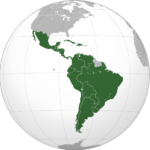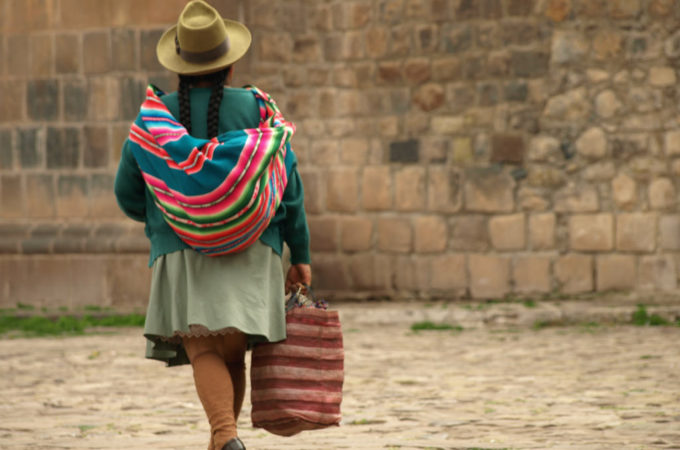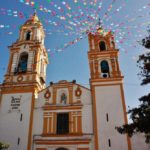Latin America is the fruit of an ethnic, spiritual and cultural amalgam, the greatest “mestizo”, “syncretistic” cultural experiment in the world, resulting in a truly “bridge people.” Originally we were a mixture of Spanish, Indian and African cultures, creatively blended and adapted to the local circumstances. Soon, however, traditional Iberian Catholicism allowed a “popular religion” suited to the local customs, superstitions and preferred versions of the Marian cult.
Intellectually, our culture was schooled in medieval Scholasticism, but it eagerly embraced in rapid succession the French Enlightenment, American Federalism and English liberalism. Politically, throughout the 20th century a Creole version of Marxism and a similarly adaptive version of democratic capitalism have dominated the public discourse. New currents such as consumerism, on the one hand and postmodernism and New Age spirituality on the other, compete for the hearts, minds and bellies of our people. To speak of a single “Latin American” culture has always been a very rough approximation at best, but each day it requires more and more specification.
Latin American worldview lacks the concept of covenant
Our history explains why our traditional Catholicism produced a Latin American worldview that lacks any idea of covenant—that supreme law that rules all human arbitrariness—which the Protestant Reformation restored to the Christian doctrine in northern Europe. It must be remembered that only in the last half of the 20th century has Catholicism allowed the Bible to be widely distributed to the people.
 Lack of a covenant theology and biblical illiteracy are, I believe, the main reasons why our cultural character is flawed. Our culture does not prepare us for responsibility or fit us for government, because our Hispanic American philosophy of church and state are tutelary in nature; Mother Church and the Benefactor Ruler take care of the flock and the citizenry. From that perspective, our culture is the cause of our underdevelopment and our falling behind in comparison with other nations of the world.
Lack of a covenant theology and biblical illiteracy are, I believe, the main reasons why our cultural character is flawed. Our culture does not prepare us for responsibility or fit us for government, because our Hispanic American philosophy of church and state are tutelary in nature; Mother Church and the Benefactor Ruler take care of the flock and the citizenry. From that perspective, our culture is the cause of our underdevelopment and our falling behind in comparison with other nations of the world.
However, in the last century, the seed of a new, biblical faith has been widely sown: it began, it is true, as a “Gospel of Salvation,” initially very pietistic, but it included several strains of Pentecostalism and promoted widely the Word of God. Over time, it has evolved into many indigenous varieties of Latin Christianity, more or less personal, biblical and dynamic.
By the last third of the 20th century, inspired by the Cuban Revolution and facilitated by the “aggiomarnento” of Vatican II, an indigenous Catholic and Protestant theology attempted to “contextualize the Gospel” to the social realities of the region. The dearth of linguistic biblical scholarship in the Latin church, the absence of a social doctrine in reformed Protestantism, and the influence of European and American liberal theologians, turned “Liberation Theology” into a mixture of social gospel and Marxist sociology. But Liberation Theology, energized by several Soviet-backed revolutions, diminished after the collapse of its backers, and never captured the hearts of most evangelical Latin Americans. In theology, ministerial and musical styles, and relational and leadership patterns, much of the Latin American evangelical church—like its Spanish-language devotional literature—still resembles a poor translation of the North American Christian experience wrapped in a passionate Latin temperament.
It’s time for Latin American Christianity to mature
The sheer economic power and undisputable zeal of the North American church explains why millions of Latin American Christians today are still being won to Christ, discipled, trained, and cultivated into leadership with ideas, materials, programs and institutions developed for the Anglo-Saxon culture of the North. Unfortunately, even when these materials are linguistically accurate, they are rarely true translations; they miss some of the sordid underside of the Latin family and worldview, and leave untouched much of the sublime poetic and emotive capacities of the Latin soul and culture. Thus we Latin Christians cannot yet enjoy, let alone give the world, the fullness of what God has put in us, because we have not yet matured sufficiently, culturally and institutionally ourselves.
For now at least, even our evangelical Christian leaders are unable to lead us and our nations forward. We easily fall into the worldly cultural patterns of generations—imprinted by our upbringing in the context of our unreformed, syncretistic and nominally Christian culture. These patterns weaken our marital covenants and distort gender, family and authority relationships, causing a subtle immaturity and a low-level dysfunction in our relationships.
However, there is an enormous transformational potential latent in the Latin Christianity, whose effects, when released, will be felt not only in Latin America, but also in the U.S., where over a quarter of the population will soon be of Latin origin. They will be felt in every region of the world, where a global Latin diaspora of economic immigrants, among them many dedicated Christians, (a natural missionary force) has been growing for several decades. In 1988, organized churches were identified among the Latin communities in 50 countries. Twenty years later that number has more than likely doubled.
The world does not know yet the flavor, impetus and emphasis which the Latin culture will give to the Gospel, once it has been released from the bondage of its own ancestral sins and cultural bondages. After that baggage has been healed, and the “rules of the game” have been changed to make way for truly loving, covenant relationships, the Spanish-speaking people will be released to fulfill the Scripture and “rebuild the ancient ruins and restore the places long devastated” (Isaiah 61:4) in their own cities and also in the nations where God has planted them.
A Latin American transformation is underway
After working for 25 years with hundreds of godly, promising, sincere Christian leaders, Semilla is now beginning to offer, through the light of the Holy Spirit, an understanding of the toxic roots of our Latin culture, and the truth that will release the power of God upon a creative, industrious and passionate people—a people who celebrate community and solidarity—beginning with their spiritual leaders. Hopefully our message will be challenging to our friends, those strategic Christian leaders who have walked with us and others. Some of them wish to become a leader of a new kind, to undertake, preferably as couples, a costly process of personal and relational transformation. Our people need models different from those which traditional culture and the various permutations of modernity and postmodernity afford.
Personal and marital transformation will spill over into relational and leadership transformation. And through the influence that leaders exert, this will be multiplied through God’s grace into social and cultural transformation. Transformed lives, teachings and testimony will challenge and change the “rules of the game” for all gender, generation, class and ethnic relationships in Latin America. On the V Centenary of the Reformation (2017) THAT is the kind of “Reformation” we seek, a holistic and full-orbed transformation, first personal, then social, that will “transform the culture by the Word of God.”
These ideas are further developed in the book by the same author, Machismo and Matriarchy: Roots that wither the Latin American culture, available in Spanish and English from www.semilla.org. The author welcomes your feedback and dialogue on these issues at jose@semilla.org.
- Jose L. Gonzalez








3 Comments
Cristina Inchaustegui
October 2, 2017 - 8:35 amYeeeessssss! I do believe in that awakening and Reformation in all LA countries.
OLUSEGUN OWOPETU
October 2, 2017 - 9:36 amVery beautiful piece for me to read from Nigeria. The write-up summarised the general outlook of the Church in that part of the world.
I was equally touched on the issue of “Covenant theology” -Lack of a covenant theology and biblical illiteracy are, I believe, the main reasons why our cultural character is flawed.
Recently I placed the map of the world’s continents before me and from my previous knowledge about the effect biblical Christianity on some of these continents – two continents -North America and Europe were privileged for the move of God among them…even in the crisis period of biblical illiteracy here and there -when you want to read balanced write-up they are still coming from that two ends. However, those with such “mature” Christian outlook are not always ready to share their wealth of God’s deposit of His grace.
Be as it may be, the rest of the continents -is Antarctic habitable? – need balanced “covenant theology” rather than prosperity gospel that is common now almost everywhere shunning the fact that Israel or the great nations were built on truth, righteousness, discipline, hardworking, integrity and training their children these virtues. They left us a store-house of knowledge -some refer to them as puritanical…puritanical that made great!!! -“Covenant theology” That’s great. Thanks for this article
admin
October 2, 2017 - 4:22 pmOlusegun
Thank you for your thoughtful response. Glad you found the piece relevant for your situation in West Africa.